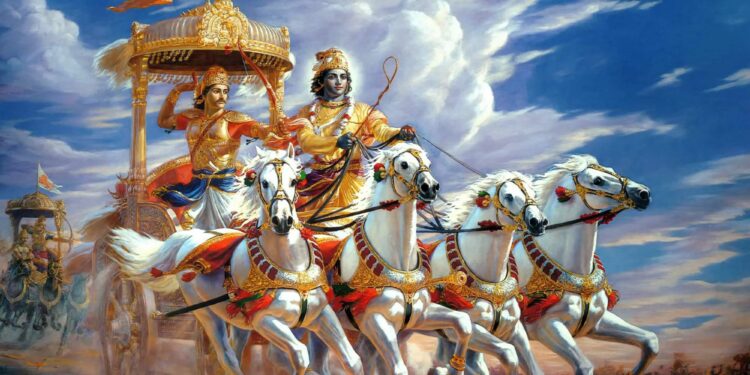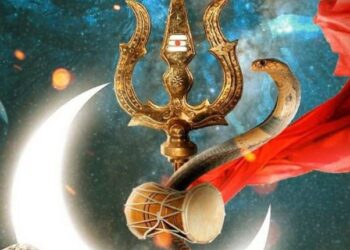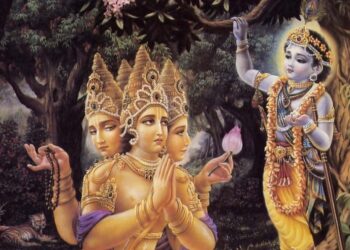TEXT 40
indriyāṇi mano buddhir
asyādhiṣṭhānam ucyate
etair vimohayaty eṣa
jñānam āvṛtya dehinam
SYNONYMS
indriyāṇi—the senses; manaḥ—the mind; buddhiḥ—the intelligence; asya—of this lust; adhiṣṭhānam—sitting place; ucyate—is called; etaiḥ—by all these; vimohayati—bewilders; eṣaḥ—this lust; jñānam—knowledge; āvṛtya—covering; dehinam—of the embodied.
TRANSLATION
The senses, the mind and the intelligence are the sitting places of this lust. Through them lust covers the real knowledge of the living entity and bewilders him.
PURPORT
The enemy has captured different strategic positions in the body of the conditioned soul, and therefore Lord Kṛṣṇa is giving hints of those places, so that one who wants to conquer the enemy may know where he can be found. Mind is the center of all the activities of the senses, and thus when we hear about sense objects the mind generally becomes a reservoir of all ideas of sense gratification; and, as a result, the mind and the senses become the repositories of lust. Next, the intelligence department becomes the capital of such lustful propensities. Intelligence is the immediate next—door neighbor of the spirit soul. Lusty intelligence influences the spirit soul to acquire the false ego and identify itself with matter, and thus with the mind and senses. The spirit soul becomes addicted to enjoying the material senses and mistakes this as true happiness. This false identification of the spirit soul is very nicely explained in the Śrīmad-Bhāgavatam (10.84.13):
yasyātma-buddhiḥ kuṇape tri-dhātuke
sva-dhīḥ kalatrādiṣu bhauma ijya-dhīḥ
yat-tīrtha-buddhiḥ salile na karhicij
janeṣv abhijñeṣu sa eva go-kharaḥ
“A human being who identifies this body made of three elements with his self, who considers the by-products of the body to be his kinsmen, who considers the land of birth worshipable, and who goes to the place of pilgrimage simply to take a bath rather than meet men of transcendental knowledge there, is to be considered like an ass or a cow”.
TEXT 41
tasmāt tvam indriyāṇy ādau
niyamya bharatarṣabha
pāpmānaṁ prajahi hy enaṁ
jñāna-vijñāna-nāśanam
SYNONYMS
tasmāt—therefore; tvam—you; indriyāṇi—senses; ādau—in the beginning; niyamya—by regulating; bharata-ṛṣabha—O chief amongst the descendants of Bharata; pāpmānam—the great symbol of sin; prajahi—curb; hi—certainly; enam—this; jñāna—of knowledge; vijñāna—and scientific knowledge of the pure soul; nāśanam—the destroyer.
TRANSLATION
Therefore, O Arjuna, best of the Bhāratas, in the very beginning curb this great symbol of sin [lust] by regulating the senses, and slay this destroyer of knowledge and self-realization.
PURPORT
The Lord advised Arjuna to regulate the senses from the very beginning so that he could curb the greatest sinful enemy, lust, which destroys the urge for self-realization and specific knowledge of the self. Jñāna refers to knowledge of self as distinguished from non-self, or in other words, knowledge that the spirit soul is not the body. Vijñāna refers to specific knowledge of the spirit soul’s constitutional position and his relationship to the Supreme Soul. It is explained thus in the Śrīmad-Bhāgavatam (2.9.31):
jñānaṁ parama-guhyaṁ me
yad vijñāna-samanvitam
sa-rahasyaṁ tad-aṅgaṁ ca
gṛhāṇa gaditaṁ mayā
“The knowledge of the self and Supreme Self is very confidential and mysterious, but such knowledge and specific realization can be understood if explained with their various aspects by the Lord Himself.” Bhagavad-gītā gives us that general and specific knowledge of the self. The living entities are parts and parcels of the Lord, and therefore they are simply meant to serve the Lord. This consciousness is called Kṛṣṇa consciousness. So, from the very beginning of life one has to learn this Kṛṣṇa consciousness, and thereby one may become fully Kṛṣṇa conscious and act accordingly.
Lust is only the perverted reflection of the love of God which is natural for every living entity. But if one is educated in Kṛṣṇa consciousness from the very beginning, that natural love of God cannot deteriorate into lust. When love of God deteriorates into lust, it is very difficult to return to the normal condition. Nonetheless, Kṛṣṇa consciousness is so powerful that even a late beginner can become a lover of God by following the regulative principles of devotional service. So, from any stage of life, or from the time of understanding its urgency, one can begin regulating the senses in Kṛṣṇa consciousness, devotional service of the Lord, and turn the lust into love of Godhead—the highest perfectional stage of human life.



















